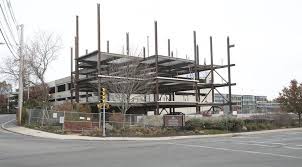 During the real estate crash of 2008, there were a ton of broken condo's in Florida. Developers would start new residential condo projects in 2007, and by mid-2008, the residential real estate market had completely collapsed. The developer would build a 100-unit condo project, but he would only sell 35 of them. The rest of them, usually several years later, would eventually be rented out as apartments. Voila! You have a broken condo.
During the real estate crash of 2008, there were a ton of broken condo's in Florida. Developers would start new residential condo projects in 2007, and by mid-2008, the residential real estate market had completely collapsed. The developer would build a 100-unit condo project, but he would only sell 35 of them. The rest of them, usually several years later, would eventually be rented out as apartments. Voila! You have a broken condo.
The construction lender, almost always a commercial bank, is usually is forced to foreclose and ends up owning the 65 unsold rental units. Typically the foreclosing bank will offer the 65 rental units for sale as a bulk sale. Why a bulk sale? Why not sell off the condo's individually? Wouldn't the bank recover a lot more by selling off the apartment units individually? After all, individuals condo's fetch far more (1.4x) per square foot than apartments.
In a few more paragraphs, I'll explain why. For now, however, suffice it to say that all 65 units will almost always be sold off in bulk. Your commercial-investment property client wants to buy these 65 rental units because they are almost brand new, and they were built with far more amenities than most apartment buildings. The object today is to finance this broken condo.
For the reasons I will outline further below, few banks will finance broken condo's. There are around 5,400 commercial banks in the U.S., and probably fewer than a 300 of them will touch a broken condo. But some banks will indeed finance broken condo's.
Most banks which will finance the purchase of a broken condo will only do so if the borrower is acquiring a majority of the condo units. This is important to the bank because the bank needs to control the homeowners' association (HOA); otherwise the HOA might pass a rule detrimental to the bank, such as no For Sale signs on the property. If your buyer is acquiring less than half of the condo units, you'll need to apply to a private money lender, like Blackburne & Sons. We here at Blackburne & Sons absolutely love-love-love to finance broken condo's.
The best way to get a commercial loan from a bank on a broken condo is by using C-Loans.com. When you enter your commercial loan into C-Loans, you should apply for a standard first mortgage on an apartment building (please remember that - as an apartment building). In the Special Issues section, be sure to write that, "This is a broken condo project. My client is buying ____ units out of a total of ____ units."
If you don't have any takers for your particular project, be sure to write to me personally. In the Subject line, please type: "Need Help With a Broken Condo."

Okay, now let's go back and see why so many commercial lenders are freaked out about making commercial loans on broken condo's. When a foreclosing construction lender takes title to a large number of unsold condominium units, it typically acquires the Special Declarant Rights and thereby become a successor Declarant. Huh? What on earth is a Declarant?
The Declarant is the person or entity that creates the original governing documents for the association. The Declarant is generally the developer of the project and usually reserves certain rights and powers to himself related to the sale of units in the project, extra voting rights, etc.
Okay, I kind of understand... But what are these Declarant's Rights that the developer is so desperate to reserve?
The Declarant's Rights are found within an association’s declaration. Here are some typical rights reserved by the declarant:
- Promotion: This allows the declarant to maintain model homes, a sales office within an existing building or unit, construct a temporary building for housing of a sales office and erect advertising or signage promoting the project and the sale of units;
- Construction: This allows the declarant to make alterations, additions or improvements to the property that it deems necessary or advisable for the project. This often includes landscaping and the storage of construction equipment and materials upon the property, without the payment of any fee;
- Easement and dedication: Easement rights allow the declarant to provide access to the property to any governmental authority, public or other utilities serving any lot or unit. Dedication rights allow the declarant to dedicate or transfer portions of an association’s common area to a county, municipality or other governmental authority that has jurisdiction over the property;
- Architectural control: This allows the declarant to formulate and bind all of the owners to certain standards governing the appearance of units/homes and the community as a whole;
- Amendment: In addition to possessing the authority to add property to the development, declarants typically have the unilateral ability to amend an association’s governing documents. In addition, any amendments the membership wishes to pass are also typically required to be approved by the declarant. If the declarant does not agree and its approval is needed, an amendment to the association’s governing documents will fail;
- Assessment payment exemption: Most declarations include an assessment payment exemption for the declarant. Often the obligation to pay assessments for a particular unit or lot does not commence until the declarant sells to a third party;
- Assignment: The right to assign allows the declarant to transfer to a third party all or some of the rights granted in the declaration.
Source: http://www.keaycostello.com/collections/declarants-rights/

Okay, George, I now pretty much understand what a Declarant is and why he wants to retain his Declarant's Rights. But why does a commercial lender give a hoot?
Let's suppose your bank finances a condo development, and the bank is forced to foreclose on a project that is not complete. The pool hasn't been dug, and the garages are not completed. As a successor Declarant, the lender is usually subject to all liabilities and obligations imposed by law on the developer, including unpaid assessments for the foreclosed units.
As a successor Declarant and a dealer (you sell more than 4 units per year), the lender is responsible for delivering a public offering statement (POS) to purchasers and is liable for any "omission of material fact there from if the lender had actual knowledge of the misrepresentation or omission or, in the exercise of reasonable care, should have known of the misrepresentation or omission." In addition, as a successor Declarant and Dealer, the lender will be liable for breach of the implied warranties of quality with regard to those units sold by the lender and the undivided interest in the common elements attributable to those units. These warranty claims typically involve defective building envelopes and can cost millions of dollars and take years to resolve.
Yikes. I'm just a banker, not a builder. I don't want to warrant that anything is free of defect.
The lender can avoid substantially all of these liabilities obligations by recording an instrument declaring its intention to hold the Special Declarant Rights solely for transfer to another person as part of a bulk sale of the remaining units to that person. This option does not allow the lender to recover the higher revenues that may be available by individually selling the units.
Now you know why the bank will insist on a bulk sale.
Attention Brokers: It is our hope that you will avail yourselves of C-Loans.com again and again; but first I just need you to register on C-Loans. This does NOT mean clicking on one of the blue buttons and getting a freebie. This means completed Step One of Six on C-Loans. Basically you're just filling in your name and contact information. We want you in a sprint start, so that you can immediately start entering your commercial loan request when you come across a live deal.
Therefore we are going to bribe you. We will give you a free copy of my famous Commercial Mortgage Underwriting Manual. But please, be fair. We're giving you a $199 freebie. Use your real email address! Recently a bunch of folks have been using email addresses other than their main email address. Basically they are giving me an email address for Junk Email.
C'mon, guys, you and I only make dough when we close loans together, and I need to remind you from time to time-to-time that:
- Blackburne & Sons makes loans on broken condo's;
- We finance nudie bars and strip centers with X-rated book stores;
- We will sometimes make non-recourse loans; and
- We will allow the seller to carry back a second mortgage behind us.
- Etc.
So please be sure to use your real email address I promise you'll find our joke-filled newsletters entertaining.






